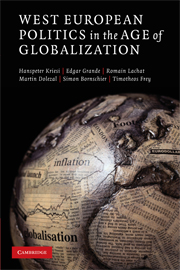Book contents
- Frontmatter
- Contents
- List of figures
- List of tables
- Preface and acknowledgments
- Part I Theory and methods
- Part II Country studies
- 4 France: the model case of party system transformation
- 5 Austria: transformation driven by an established party
- 6 Switzerland: another case of transformation driven by an established party
- 7 The Netherlands: a challenge that was slow in coming
- 8 The United Kingdom: moving parties in a stable configuration
- 9 Germany: the dog that didn't bark
- Part III Comparative analyses
- Appendix A Technical appendix
- Appendix B Detailed statistical results
- References
- Index
6 - Switzerland: another case of transformation driven by an established party
Published online by Cambridge University Press: 05 September 2012
- Frontmatter
- Contents
- List of figures
- List of tables
- Preface and acknowledgments
- Part I Theory and methods
- Part II Country studies
- 4 France: the model case of party system transformation
- 5 Austria: transformation driven by an established party
- 6 Switzerland: another case of transformation driven by an established party
- 7 The Netherlands: a challenge that was slow in coming
- 8 The United Kingdom: moving parties in a stable configuration
- 9 Germany: the dog that didn't bark
- Part III Comparative analyses
- Appendix A Technical appendix
- Appendix B Detailed statistical results
- References
- Index
Summary
Introduction
The Swiss political system is often viewed as an example of stability. The consensual style of politics, the unusual longevity of the grand coalition which forms the federal government, the high level of cooperation between social partners and the state, are all factors that explain or have contributed to this image. Further, such a perception is not only the point of view of outside observers. Kerr (1975), for example, emphasized in the 1970s that Switzerland had not faced any major political change since the late nineteenth century. This image is even reinforced by data from opinion surveys in this period, showing that Swiss citizens, in comparison with citizens of other European countries, are among the most satisfied with the state of their economy and political system (Sidjanski 1975).
Yet, over the last decades, Swiss politics have been marked by important developments. The transformations may seem to be less impressive, less dramatic than in neighbouring countries. But, at least by Swiss standards, they are significant and indicate deep changes in the social and economic basis of political cleavages. The single most important development is certainly the rise of the Swiss People's Party (SVP). A traditionally rural and Protestant party, it gradually changed its political orientation in the 1980s and early 1990s and has now become one of the most potent examples of the success of the populist right (Kriesi et al. 2005).
- Type
- Chapter
- Information
- West European Politics in the Age of Globalization , pp. 130 - 153Publisher: Cambridge University PressPrint publication year: 2008



